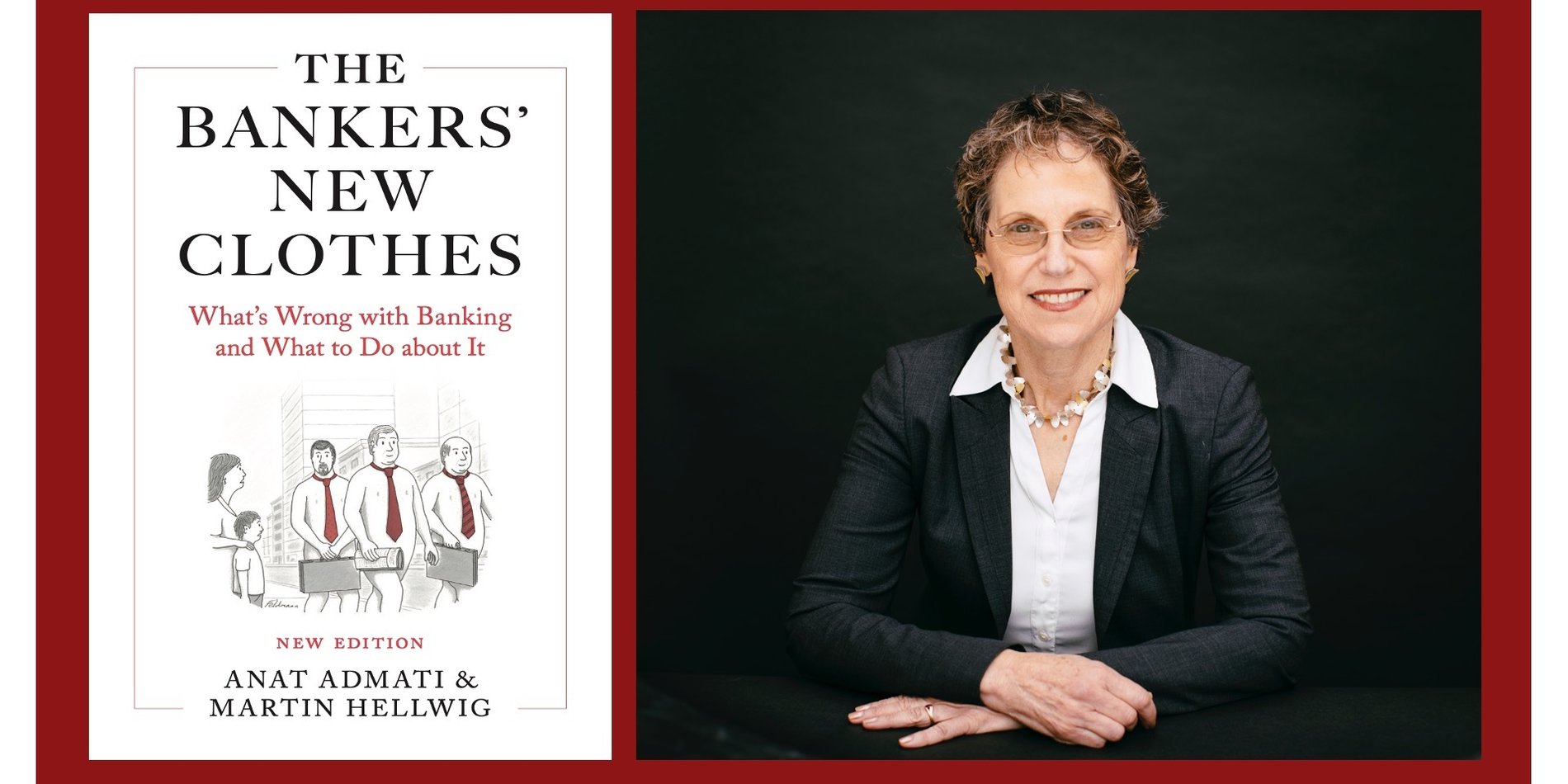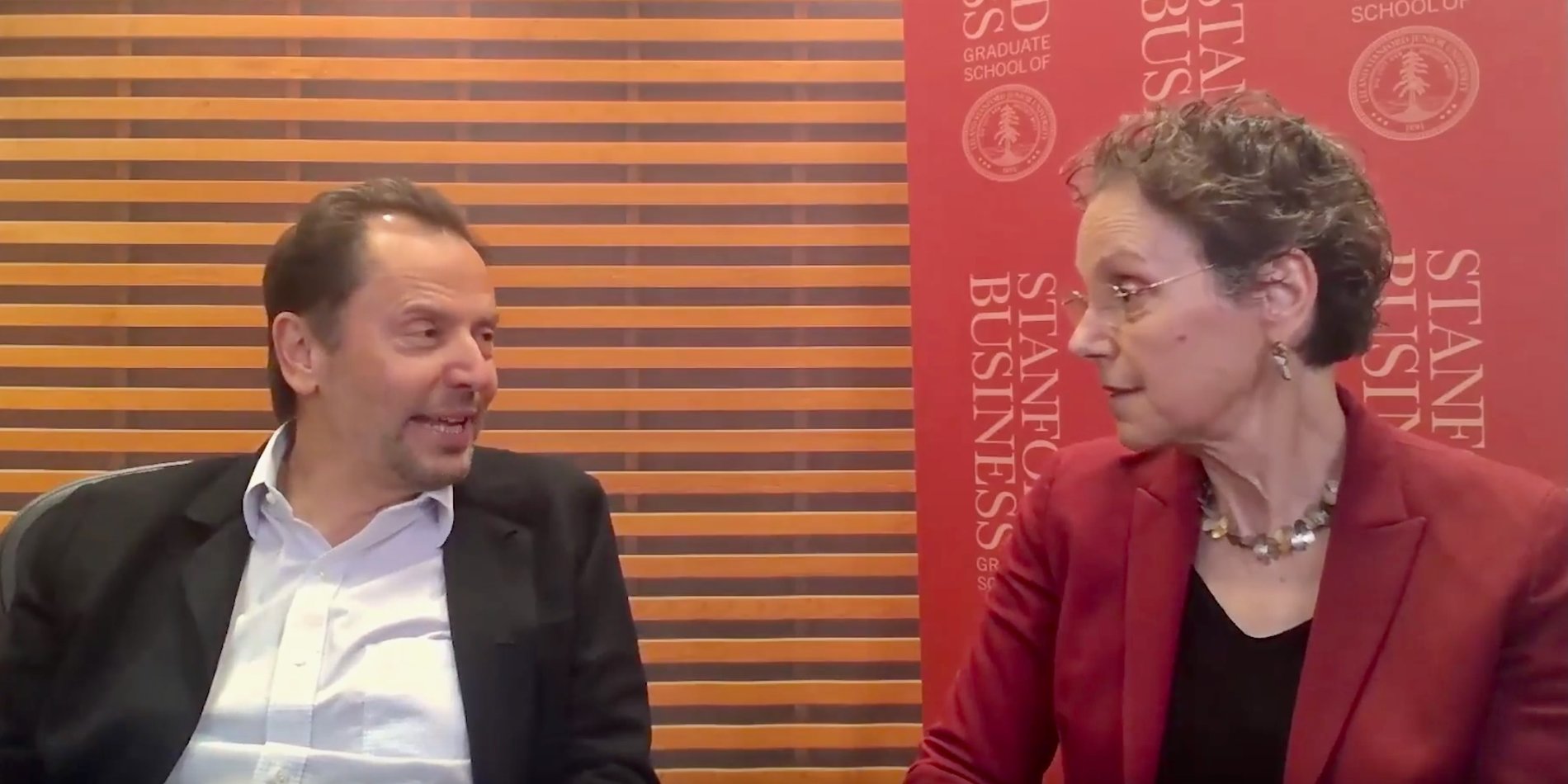NYT Reporter David Gelles: In the Lion’s Den – did Jack Welch Really Break Capitalism?
Watch the event:
Not that long ago Jack Welch was the world’s most celebrated CEO. In 1999, Fortune magazine named him ‘Manager of the Century’ for his role in transforming General Electric from a maker of light bulbs and washing machines to a multinational conglomerate with a market value of more than $400 billion. But in recent years, his reputation has undergone a critical reexamination and his reputation has suffered. At the forefront of the critical reevaluation is New York Times reporter David Gelles, who wrote the book, Jack Welch: The Man Who Broke Capitalism. Gelles argues that Welch was the driving force behind much that's wrong with corporate America today.
Gelles was the guest speaker at CASI’s first in-person event of the GSB Autumn Quarter, which was live-streamed to a national audience. One of CASI’s goals is to hold corporations and their leaders up to scrutiny in the context of their impact on society, and this topic proved to be a popular and impactful way to kick off the quarter.
CASI student Co-Director, Louise White, introduced Gelles and moderator Professor Jeffrey Pfeffer, who led the lively discussion. Pfeffer is the Thomas D. Dee II Professor of Organizational Behavior at Stanford’s Graduate School of Business and is considered one of today's most influential management thinkers.

David is here to “dive into the moral and economic consequences of a business model that puts profits above all else”, said White. With Professor Pfeffer, “we could not have a better person with us to help unpack the legacy of Jack Welch.” Gelles noted that while he’s done many events for his book, this was the first time he felt like he was “in the lion’s den.” The room burst into laughter. Pfeffer began the conversation by stating, “this is a remarkable story about a remarkable person; essentially a debunking of Jack Welch and a reputation that was created by the business media. The story of his debunking could be the story of Elizabeth Holmes and her debunking. On the cover of every major business magazine, (she was) a business hero until John Carreyrou wrote Bad Blood.”
Pfeffer asked to what extent Gelles would hold the media responsible for glorifying Welch and creating a misleading narrative. Gelles responded that, “In the writing and researching of this book, what I discovered is that the role of the business media in creating the myth and legacy of Jack Welch is essential.”
Gelles readily admitted that, as someone who has written flattering profiles of innumerable CEOs and corporations, this was his “own soul searching as I went through this process, and it’s been part of my evolution as a professional” to come to terms with “Whose story am I trying to tell? Am I trying to tell the stories of the executives, mostly men and some women, who are enormously wealthy and have extraordinary power to shape not only their corporations and society, or am I also, or primarily perhaps, trying to tell the story of people whose lives they affect?”
Gelles felt that, on balance, the mainstream business media has recently been doing a better job of scrutinizing the role of CEOs and their own mythmaking than in previous generations.
When Professor Pfeffer said that he was not 100% sure of that, Gelles defended his position, contending that the popular business press is focusing more on holding tech companies to account these days. He called out the management journal articles and case studies written in business schools as being more at fault, including “a lot of the publications that professors here are publishing and a lot of the things that comprise the case studies and curriculums at business schools today.”
Professor Pfeffer then challenged Gelles for making Jack Welch the main villain in a story that, in Pfeffer’s opinion, involved many people, including the corporate raiders of that era, such as Carl Icahn and T. Boone Pickens.
Gelles acknowledged that Jack Welch did not act in a vacuum. He took the audience through a short history lesson of the early 1980s and explained that society, as well as the economy, was poised for dramatic change. “We had a decade of stagflation, Germany and Japan were coming online as real serious competitive industrialized economies, Wall Street was changing, the way money was moving was changing, and so absolutely things were going to change.”
He also pointed to a decade or more of intellectual thinking and academic work trying to reassess the role of business and society. “The seeds had been planted for real radical change.”
But Gelles asserted that a strong social contract previously existed in the postwar years during what he called “the golden age of capitalism,” a time when corporations embraced a broader stakeholder perspective.
Big companies back then, “and GE is a perfect example of this,” he said, were proud of the way that they distributed the value they created with their employees, with their suppliers, and even with their communities and the government. He called out a 1953 annual report by GE where the company bragged about how much it was paying in salaries to workers and how much it paid in taxes to the government. “I mean that’s unrecognizable today, that sounds like a foreign world. But then Jack comes, and he flips all of that on its head.”
“It’s hard for us to sit here and understand how influential GE really was back in 1981. But this is a company that at its peak represented 1% of GDP, and for a century was the corporation that other corporations looked to for guidance.” He went on to say, “Enshrined in the public imagination is (Welch’s) way of doing business as the best way of doing business. And we’re still living with that legacy today.”
Gelles explained how Welch was firing workers en masse in “the best of times” and that it marked a shift in the social contract. “He, above all, changed that dynamic.”
But Gelles sounded hopeful. “I think we're at the beginning of a reassessment, a real re-engagement with that debate of what is the purpose of a corporation.”

During the question-and-answer period, Gelles highlighted some examples from his book of corporations that have started taking steps to undo the legacy of Jack Welch, such as PayPal.
Gelles ended the conversation by sharing his thoughts on how we can replace Welch’s enduring influence with better business leadership today.
“What needs to change? That includes markets, regulation, and frankly how CEOs and executives think about taking care of their people. It includes labor unions, it includes employee activism. It takes all of these things having to move in a different direction and none of that happens very quickly,” he said.



